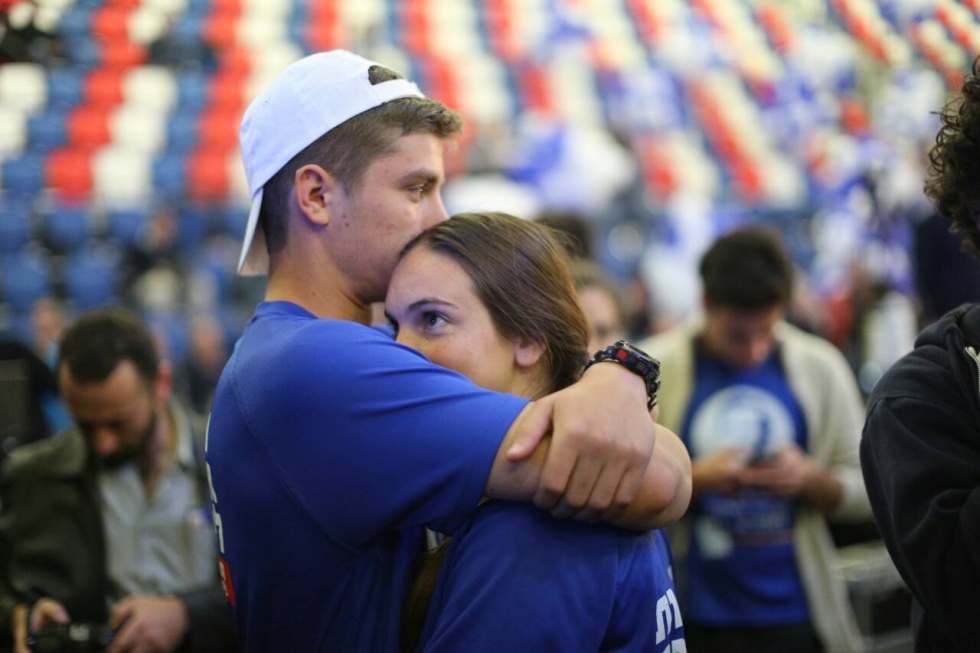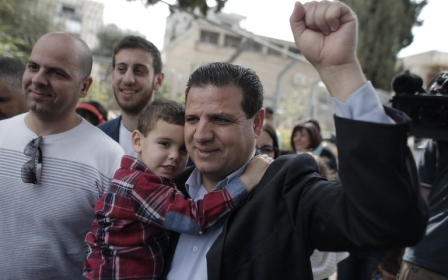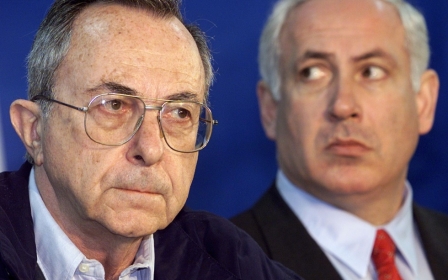Netanyahu's Likud takes lead with 24% of counted votes

Benjamin Netanyahu's Likud Party leads in Israel's Knesset election with 24.4 percent of the votes, according to Israel's election commission.
The Zionist Union, which is led by Isaac Herzog, comes in second position with 19 percent of the votes, the commission was quoted by the Israeli newspaper Yedioth Ahronoth after 57 percent of ballot boxes had been counted in polling stations across Israel.
The Joint Arab List, meanwhile, has won 8.4 percent of all votes counted so far.
Late Tuesday, Israeli Prime Minister Benjamin Netanyahu claimed victory in elections after a late fightback in his bid for a third straight term.
The first exit polls, however, suggested a tight race between Netanyahu and Isaac Herzog of the centre-left Zionist Union.
"Against all odds we achieved a great victory for the Likud. We achieved a great victory for the national camp under the leadership of the Likud. We achieved a great victory for our people of Israel!" Netanyahu told cheering supporters at campaign headquarters in Tel Aviv.
"Now we have to build a strong and stable government," he added.
But Herzog insisted he was still in the race to form the next government.
"Everything is open," he told activists in Tel Aviv.
"I intend to make every effort to build a real social government in Israel."
Various polls conducted nationwide by Israeli television channels showed Netanyahu and Herzog could be neck-and-neck with 27 seats apiece.
While Channel 2 polls, put Netanyahu at 28 seats, one seat ahead of Zionist Union, both the official government Channel One, and the independent Channel 10 put them at 27 each.
According to all the polls, the joint Arab list is in third place with 13 seats, although their leadership has said that they hope this will increase to 14 seats by the morning.
Some analysts have pointed out that Palestinian citizens of Israel tend to vote later in the day, possibly coming out as late as the last hour of voting, which could influence later exit polls.
Some voters described waiting until the last moment to cast their votes, so that they could have more weight, they told Israeli daily Haaretz.
“We will vote as late as possible, when we have a better sense of who needs our help,” said one man playing football on a beach near Tel Aviv.
Yair Lapid’s centrist Yesh Atid came fourth with between 13 to 11 seats, according to the different polls. Kulanu has between nine and ten, and ultra-orthodox Shas has seven.
While initial reports suggested the liberal Meretz had failed to pass the electoral threshold, they seem to have scraped in with five seats. Foreign Minister Avigdor Lieberman’s far-right Yisrael Beitenu also appears to have only secured five seats.
Israel’s beaches and ballot boxes had been abuzz throughout Tuesday as people chose the country’s 20th Knesset, amid frantic last-ditch campaigning by politicians across the board.
Long queues formed at some ballot boxes as Israelis flocked to cast their vote in an election seen by some as a “referendum on Netanyahu”.
Despite the party atmosphere that prevailed in much of Israel, with many enjoying the sunny weather and the public holiday given over to the election, turnout was high.
By 20:00 local time (18:00 GMT), voter turnout was 72 percent, although this fell short of the 80 percent turnout some had anticipated.
Israel’s proportional voting system, in which voters select party lists rather than individual members of the Knesset, means that often unstable coalitions dominate the political scene.
As the results broke, joyious scenes were reported at both the Zionist Union and Likud camps.
Oren Ziv, reporting for MEE from the Zionist Union headquarters said that the mood there seemed victorious.
“This is a victory and means that the situation will improve and we [Zionist Union] will be able to form a government,” Oren Pasternak a field activist from Zionist Union told MEE.
“According to the polls, the Israeli public does not want Netanyahu as a Prime Minister. We started the campaign with 12 seats in the polls so for us this is a big success. We remain optimistic and have a lot of energy for the rest of the evening.”
But others felt Netanyahu had edged ahead despite pre-election polls putting him up to four seats behind the Zionist Union.
Amid uncertainty over the make-up of potential future coalitions, politicians engaged in last-minute plays for votes on the last day of a campaign marked by attacks ads and negative messaging.
Election day coverage was dominated by a row over Netanyahu's last-minute attempts to garner right-wing votes for his ruling Likud party.
Netanyahu, who is seeking a third consecutive term in office after almost nine years in power, and a fourth term in total, posted a video on his Facebook page in which he warned that Arab voters were “coming out in droves”.
“The right-wing government is in danger. We have only you. Get out to vote, bring your friends and family”.
The message, slammed by opponents from the centre-left Zionist Union as “horrendous,” came after polls showed the Prime Minister trailing behind the Zionist Union by as many as four seats.
Netanyahu was later reprimanded by the Central Elections Committee, which regulates the vote, after attempting to give a televised address in the late afternoon.
“Election propaganda” is prohibited on election day, and opposition parties called for an injunction against the broadcast – the Elections Committee acquiesced, banning Israeli media from airing the statement.
Netanyahu hit back at the committee, claiming that every player in the election had issued last-minute “campaign propaganda”.
“All day politicians have been talking in the media,” the leader said in a Facebook post.
“The only one barred from talking over the media is me”.
The committee also stepped in to discipline the ultra-Orthodox Shas party for promising “keys to heaven” for voters who selected them.
“Those who vote for Shas will go straight to heaven,” read a leaflet being distributed by party activists on Tuesday.
Despite the wrangling of the final push for votes, many Israelis said their minds had been made long before polling day.
“I’ve always voted Likud and I think, I hope, that things will get better under Netanyahu,” Elizier, an Israeli citizen from central Jerusalem, told MEE.
Another voter, who only gave the name Shelley said she voted for the right-wing Jewish Home: “Because I’m a religious Zionist. The rest is self-explanatory”.
Some voters said also their decisions were little affected by the personal negative campaigning after an election in which many opposition activists united behind the slogan “Anyone But Bibi”, the popular nickname for Netanyahu. Herzog, the Zionist Union frontman, launched a personal attack against the leader on Tuesday, calling him a “lying, inciting Prime Minister”.
Margalit Elis, an 87-year-old who has voted in every one of Israel’s 20 elections, said on Tuesday that she had voted for Moshe Kahlon, head of the Kulanu [All Of Us] party and a former Communications Minister under Netanyahu who won popularity by slashing the price of mobile telephone charges.
“He is a man of the people, he is nice and makes a good impression,” Elis told Israeli daily Jerusalem Post.
Middle East Eye propose une couverture et une analyse indépendantes et incomparables du Moyen-Orient, de l’Afrique du Nord et d’autres régions du monde. Pour en savoir plus sur la reprise de ce contenu et les frais qui s’appliquent, veuillez remplir ce formulaire [en anglais]. Pour en savoir plus sur MEE, cliquez ici [en anglais].




